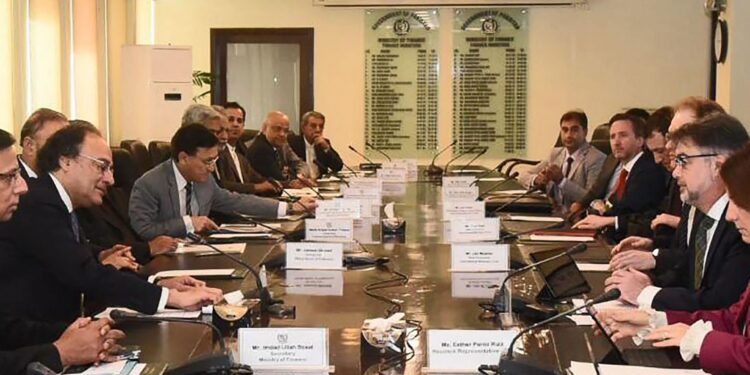Pakistan is looking to raise up to $4 billion from commercial banks in the Middle East by the next fiscal year, as it seeks to plug external financing gaps, central bank governor Jameel Ahmed told Reuters in an interview on Tuesday.
In an extensive interview, his first with any media organization since taking office in 2022, Ahmed said Pakistan was in the “advanced stages” of securing an additional $2 billion in external financing, which is needed to win approval from the International Monetary Fund for a $7 billion bailout program.
Pakistan and the IMF reached an agreement on the loan in July, but it still awaits approval by the IMF’s Executive Board and “timely confirmation of necessary financing assurances from Pakistan’s development and bilateral partners.”
The Governor of the Central Bank of Pakistan expects that financing needs will be easily met during the next fiscal year and in the medium term.
Pakistan has previously relied on traditional allies such as China, Saudi Arabia and the UAE to “roll over” debt rather than default.
Ahmed said he expected to receive similar guarantees over the next three years, giving the government more time to get its finances in order.
He explained that the “Central Bank” estimates Pakistan’s total financing needs in the coming years at less than the 5.5% of GDP that the International Monetary Fund had forecast in its latest report on the country in May.
“Pakistan’s overall financing needs have declined in the past few years,” Ahmed also said.
“The IMF estimates are based on a current account deficit higher than the recorded rate in FY24 and the current projected rates for the next few years. Therefore, our estimates for Pakistan’s total financing needs are below 5.5%,” he added.
Interest rates and inflation
Asked about monetary policy, the Reserve Bank of Pakistan governor said the latest interest rate cuts had had the desired effect as inflation continued to slow and the current account remained under control, despite the cuts.
Pakistan’s annual consumer price index (CPI) recorded 11.1% in July, down from its high of over 30% in 2023.
“The Monetary Policy Committee will review all these developments,” Ahmed said, adding that future interest rate decisions cannot be determined in advance.
The Pakistani central bank has cut interest rates from a record 22% to 19.5% in two consecutive meetings, and is scheduled to meet again to review monetary policy on September 12.
There were some concerns in the markets that the Pakistani government might take advantage of low interest rates to borrow more, but the central bank governor said he did not expect that to happen.
“We know that the government will continue on the path of fiscal consolidation despite the interest rate cuts,” Ahmed said.
Facing challenges
The governor of the Central Bank of Pakistan, who took office for a five-year term in August 2022, said that his first year was “very difficult.”
In 2023, Pakistan faced a severe balance of payments crisis, with the central bank’s reserves being enough to cover only one month of imports.
After 8 months of arduous negotiations on fiscal discipline, the IMF approved a 9-month, $3 billion bailout programme for Pakistan.
“Last year was much better,” Ahmed said. “Now things are under control from a foreign transaction management perspective.”
He added that the bank will now focus on growth, digital transformation and financial inclusion.
“We now have to focus on growth and other related areas because these are equally important” to job creation and other social and economic issues, he said.
He pointed out that the role of the Central Bank is to ensure price and financial stability before shifting its focus towards growth.



